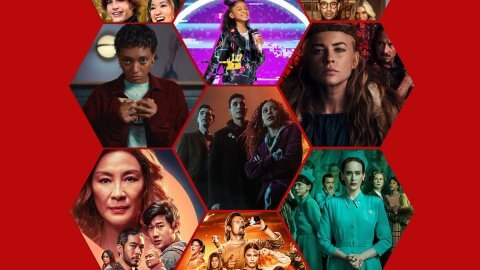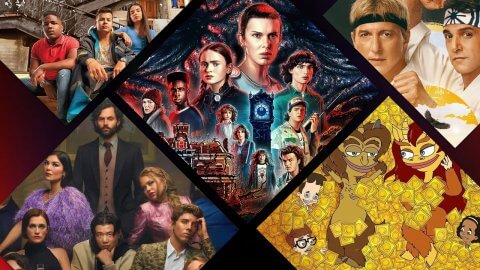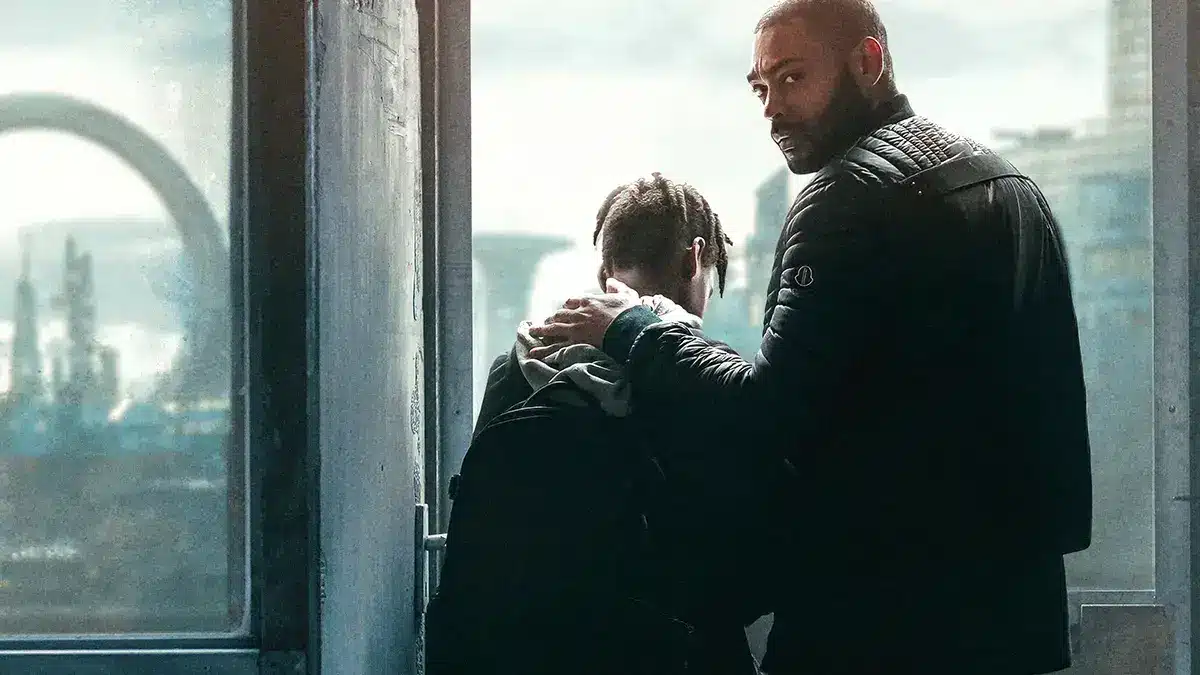
Picture: Netflix
The new dystopian drama, The Kitchen, is now streaming on Netflix globally, but should you watch it?
Premiering as the closing night film at the BFI London Film Festival, The Kitchen marks the feature film directorial debut for Oscar-winning actor Daniel Kaluuya (Get Out, Judas and the Black Messiah) and Co-Director Kibwe Tavares, who previously won the Special Jury Prize at the 2012 Sundance Film Festival for his short film Robots of Brixton. Kaluuya also produced the film alongside Executive Producer Michael Fassbender (The Killer, Inglourious Basterds) and co-wrote the script with writer Joe Murtagh (Calm With Horses, Gangs of London).
Editors Note: You can find Kasey Moore’s BFI Film Festival review here.
The film stars a pair of Top Boy standouts, Kane “Kano” Robinson & Hope Ikpoku Jnr, playing Izi and Staples, respectively, as they try to break out from their small-screen success into a possible big-screen future. Also starring is newcomer Jedaiah Bannerman as Benji, A Boy Called Christmas star Henry Lawfull, and football legend Ian Wright (Ted Lasso) as community DJ Lord Kitchener.
Described as a “love letter to London” in an “extreme version of our current world” by co-director Tavares, the story is built around a city in stark financial contrast. The rich live comfortably in their growing posh, digitally-enhanced existence while lower-class communities increasingly erode under the weight of gentrification. One such community, “The Kitchen”, is under constant attack in the war against housing projects. The city and private ownership is forcing the tenants of “The Kitchen” to vacate, but they simply won’t leave as they have no place else to go in a city that is leaving them behind. Frequent violent police raids strike fear into its population as many are taken or killed in the process while basic supplies like water and food have been cut off.
One such resident of The Kitchen, the downbeat and solitary man Izi, is desperately looking to move on and move out. Not feeling tied to his fellow residents, the community that raised him, or the rebel gangs that strike back against the city for their harsh treatment, Izzy hopes that his application to a safer, more advanced single-occupancy apartment will come through any day.
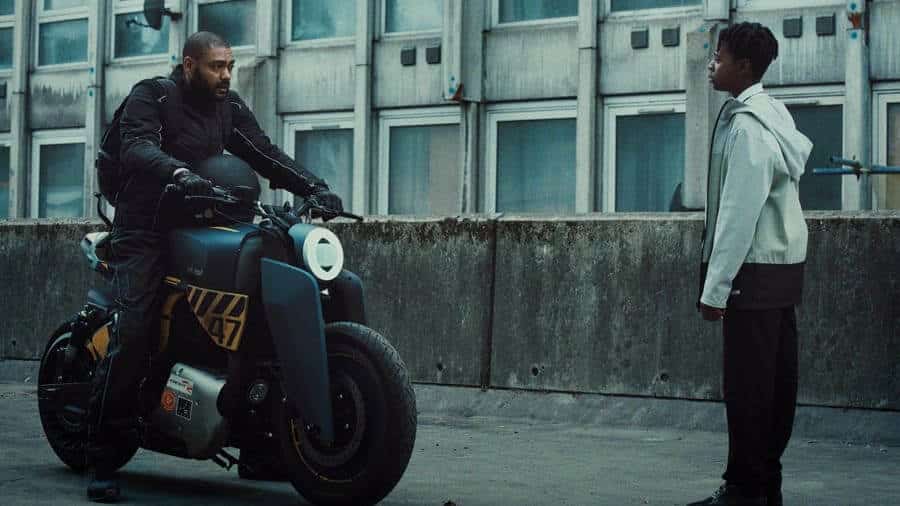
Picture: Netflix
However, Izzy’s life and plans for the future are thrown with the appearance of young Benji, a boy reeling from the recent loss of his mother with no place to go. Meeting at Benji’s mother’s services at the high-tech funeral in which Izzy works, the two form a reluctant partnership. Benji was told by his mother prior to her death that his father lived in “The Kitchen” and Izzy knew his mother long ago. Trying to maintain a relationship at arms length, Izzy is compelled to look after the boy’s wellbeing, but doesn’t want to fully commit as to derail his plans for finally leaving for the life he wants to lead. Faced with the possibility that he could be the boy’s real father and his absence could tempt Benji to join with the community’s rebel gang, Izzy must make a decision that could alter his life forever.
Winner of 2 British Independent Film Awards for Best Effects and Best Production Design, The Kitchen succeeds in providing a shockingly plausible glimpse into our future city issues while creating an atmosphere of fear, confusion, and despair. The look and feel of a distant future London divided between a thriving wealthy class pushing into the digital age with security and comfort and a decaying, impoverished lower class feeling their lives shifting under their feet is well conveyed for the majority of the film, especially at the scale of the film’s budget.
The film also features solid performances from its leads Kane “Kano” Robinson & Jedaiah Bannerman. Their pairing gives the story meaning as they both are forced to grow up and take hold of their unstable lives at the bottom of the societal food chain. Bannerman’s character Benji also provides the audience a more in-depth look at the layers of living in “The Kitchen” with a sense of awe & terror that can only be provided by someone experiencing it for the first time.
However, while it can impress on the surface, The Kitchen seems to lack much depth in its messaging and lead characters. With most dystopian versions of our modern society, the setting would seem like a commentary on our current systems; scarcity of affordable housing for the poor as they are pushed into extreme poverty at the behest of the rich and connected who wish to blot out those their lifestyle has left behind. Though outside of a couple scenes, the film does little to understand what is happening to the people of The Kitchen, why they should have pride in living there, why they should fight back, and who exactly they should be fighting back against.
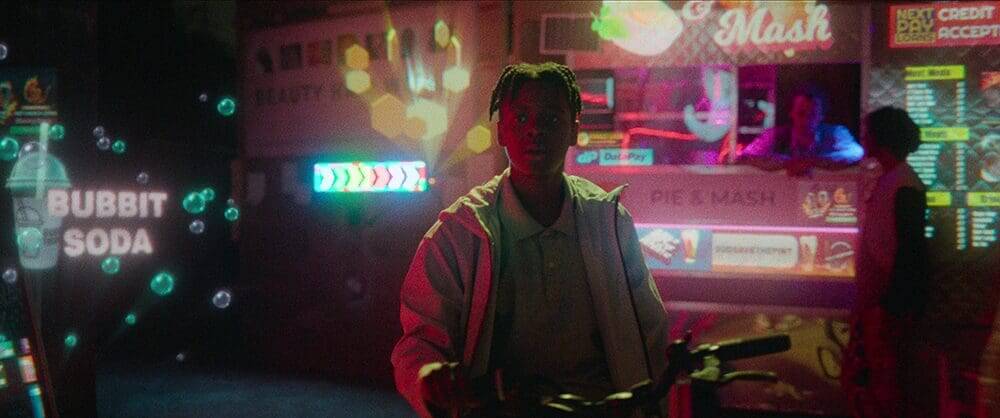
Picture: Netflix
More specifically, when you try to make “The Kitchen” a character unto itself, it would make sense to define an ethos or a central character that provides the identity for their existence. The story attempts this in a vague & thin way with Lord Kitchener, the “voice” of the community as the resident DJ, but they never show his face or show him interacting with the people to know his role in their lives. He speaks in loose platitudes that speak of banding together without really saying why, especially when it could mean detainment & death. His later demise in the film tries to have a larger impact to the main cast, but it rings false as the story did not provide much emotional resonance to act as a rallying cry
The depth issues also stem to our protagonist Izzy as we don’t know enough of his backstory in key elements to follow his motivations more closely. Does he have a previous history with the gangs to warrant his apprehension for Benji to join with them? What was his relationship like with Benji’s mom? Did he resent her for getting out? Did that change his perspective and motivations for living in “The Kitchen”? More importantly, what does Benji’s presence provide for him that he was lacking in his past or present? What does Izzy want for his future?
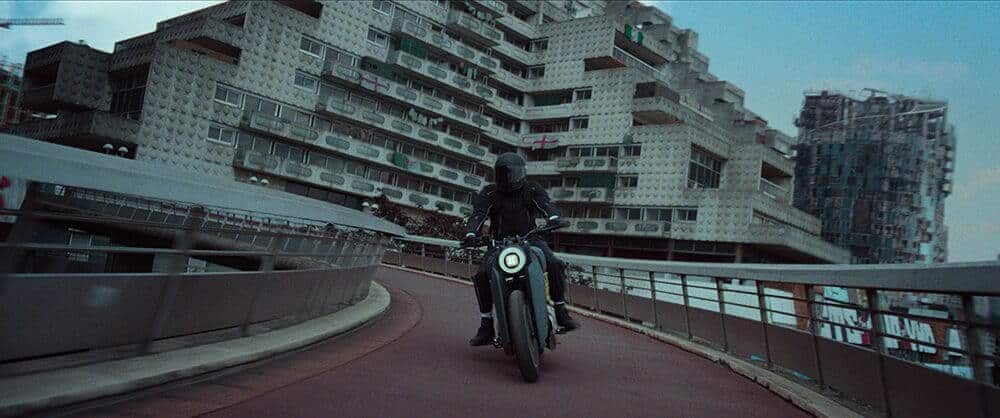
Picture: Netflix
Answers to some of these burning questions could have enhanced the drama and given purpose and meaning to several of the key actions in the film, especially the final moments. The implication of a darker ending for the leads doesn’t seem to fit when they don’t seem to deserve it, nor does the situation seem hopeless enough to justify it. Izzy knows the way out in a sense and finally gives in to his responsibility & emotions. Why is he – and by extension, the audience – punished for that awakening?
Overall, The Kitchen has a lot to admire in its world-building and tone setting but lacks the conviction and emotional depth to fully grab hold of its audience. With well-deserved accolades for production design and special effects on a smaller indie budget, one could see a bright future for the film’s creators with a more defined script behind them. However, this film seems like a trial run more than a complete thought. I look forward to what Kaluuya and Tavares will come up with next.
Watch The Kitchen on Netflix If You Like
- Top Boy
- Athena
- The Last Black Man in San Francisco
- A Thousand and One
- Boyz n the Hood
- Children of Men
- Total Recall
MVP of Netflix’s The Kitchen
Jedaiah Bannerman as Benji
While the script seems to lack definition for our first main character in Izzy, the role of Benji seems to provide the closest thing to a complete thought. Bannerman gives Benji a sense of wonder and wanting as his character tries to find stability and meaning in the next phase of his life after his mother’s death. The need for connection in a setting under constant pressure gives the film the most life in a less defined script.

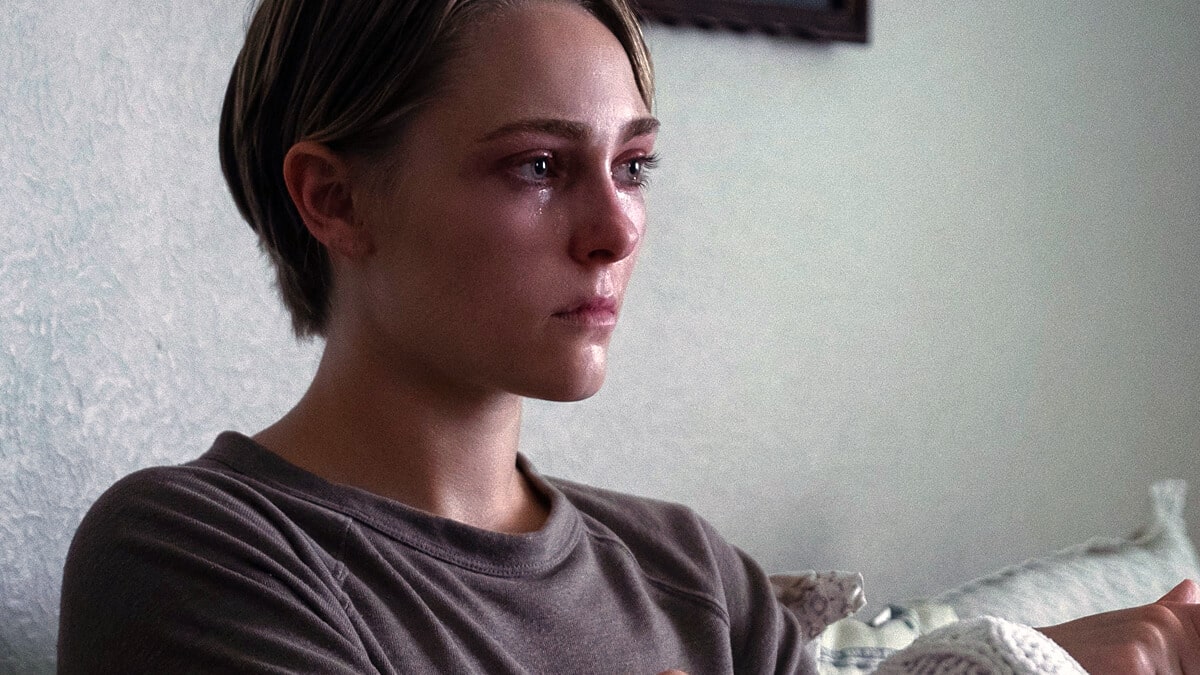
 Rating: R
Rating: R